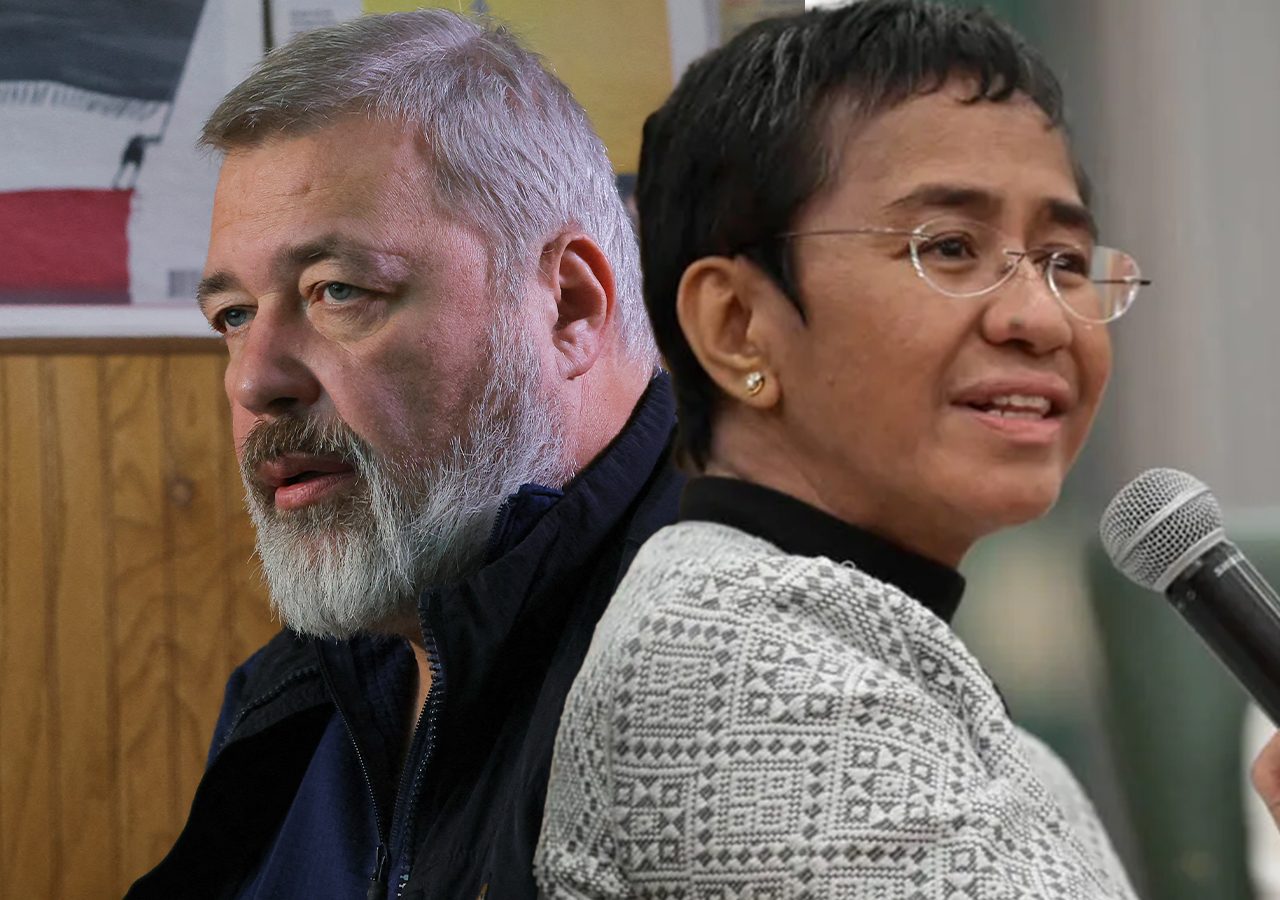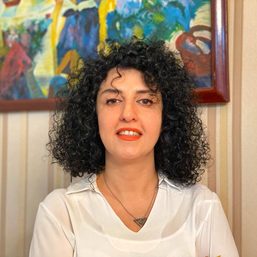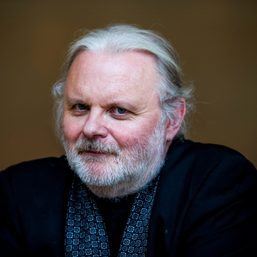SUMMARY
This is AI generated summarization, which may have errors. For context, always refer to the full article.

MANILA, Philippines – Nobel Peace Prize laureate and Rappler CEO Maria Ressa on Tuesday, October 11, continued to face an ongoing campaign of intimidation and harassment as the Court of Appeals rejected the motion for reconsideration over a cyber libel conviction.
On October 8, it had been a year to the day when Ressa and fellow journalist, Dmitry Muratov, the editor of Russia’s Novaya Gazeta, were awarded the Nobel Peace Prize. For the optimist, it was the boost that journalism perhaps needed, especially amid a global democratic crisis. A boost it had been, but the summit of this mountain of a problem appears to have shot further up as well in the past year.
In Muratov’s Russia: Putin’s war that the country’s journalists can’t even call a war, among the many things they are not allowed to say, or face penalties. Gazeta held out for as long as it could before eventually suspending operations on March 28, and in September had its license revoked. As written by the Associated Press in its own story on the Nobel anniversary, the revocation was, according to Muratov, a “control shot to the head” to make sure the newspaper was dead.
In the Philippines: the Marcoses return to power, with the scion riding the waves of disinformation – and playing adeptly the dynastical power dynamics of Philippine politics – to victory. The names may have changed – Duterte to Marcos – but the intimidation towards the press remains.
Two days before Marcos was to assume power, the Securities and Exchange Commission upheld the revocation of Rappler’s operating license over claims of foreign investment, which Rappler has disputed. In Marcos’ first days, the Court of Appeals upheld a spurious cyber libel conviction, a decision which Ressa and co-accused, former Rappler journalist Rey Santos Jr., appealed. That appeal was the subject of the October 11 rejection.
Malacañang congratulated Ressa three days after the Nobel had been given, and three days after the Kremlin had done the same for Muratov. Pro-Duterte trolls, and Duterte propagandists attempted to sling mud at the award.
The year that was
Ressa was almost not able to attend the actual awarding ceremony of the Nobel in December 2021. Then-solicitor general Jose Calida called the Rappler CEO a flight risk, attempting to bar Ressa from traveling to Norway. The appeals court would, a month later, grant Ressa the permission to travel.
At her Nobel lecture, Ressa punctuated the need to re-establish facts and a shared reality: “An invisible atom bomb exploded in our information ecosystem, and the world must act as it did after Hiroshima. Like that time, we need to create new institutions, like the United Nations, and new codes stating our values, like the universal declaration of human rights, to prevent humanity from doing its worse. It’s an arms race in the information ecosystem. To stop that requires a multilateral approach that all of us must be part of. It begins by restoring facts.”
Technology had been a pillar of Rappler’s growth, but Big Tech – under a system that milks and abuses personal data and has few gods aside from the bottom line – has also been the key accomplice leading to the disintegration of facts.
It’s always something that Ressa has vocalized over and over again in her interviews and speeches. In one of these, she told Germany’s DW News in October 2021: ”I think that the rollback of democracy globally and the tearing apart of shared reality has been because of tech. It’s because news organizations lost our gatekeeping powers to technology — and technology took the revenues that we used to have along with. They took the powers, but they abdicated responsibility.”
This would culminate in her and Muratov forming a 10-point plan to address the information crisis, which they presented at the Freedom of Expression Conference at the Nobel Peace Center in Oslo, Norway in September 2022. It called to bring an end to the surveillance-for-profit business model, end tech discrimination, and rebuild independent journalism.
“Big tech platforms have unleashed forces that are devastating independent media by swallowing up online advertising while simultaneously enabling a tech-fueled tsunami of lies and hate that drown out facts. For facts to stand a chance, we must end the amplification of disinformation by tech platforms,” the petition went.
In June 2021, Muratov also auctioned off his Nobel medal for a record $103.5 million to aid children displaced by the war in Ukraine.
‘I want journalists to die old’
Muratov in his own Nobel lecture, punctuated why the journalist is more important than ever.
“The world has fallen out of love for democracy. The world has become disappointed with the power elite. The world has begun to turn to dictatorship. We’ve got an illusion that progress can be achieved through technology and violence, not through human rights and freedoms. This is progress without freedom? It is as impossible as getting milk without having a cow,” he said.
And in a world where the powerful can actively promote war and violence, and push their propaganda, it is more important than ever for journalists to be clear in their mission, and that is “to distinguish between facts and fiction.”
In a most touching moment, Muratov said, “I want journalists to die old,” calling the Nobel crowd to join him in silence for those who have been persecuted for telling the truth. Muratov dedicated his award for his colleagues who were killed for doing their jobs.
In spite of these words from the laureates, the persecution remains. In the Philippines, just a week ago, a Marcos and Duterte critic, broadcaster Percy Lapid, was gunned down. A week later, the aforementioned appeals court denial of Ressa and Santos Jr’s cyberlibel appeal would go down.
In the West, a war continues, and Russian journalists, including Muratov’s own, find themselves in exile, operating in Latvia as Novaya Gazeta Europe. Euronews writes, “For [Kirill Martynov, editor-in-chief of Novaya Gazeta Europa], the only way for journalism to exist now in Russia is for independent outlets like his to leave the country and work from abroad and to use shadow reporters, ‘people who work in a very risky situation.’”
The work to restore facts and protect and uplift those attempting to restore facts, and to bring accountability to online platforms and algorithms had always been an uphill climb. A year on since the Nobel brought the spotlight on two journalists instrumental to the fight, it seems the path has only gotten steeper.
Ressa has said a number of times that if things don’t change, democracy will die in 2024.
In Muratov’s backyard, it’s millions of lives that are in a direct line of fire. “In the absence of media, propaganda has become a new religion. It has its own priests, its own god, the President of Russia Vladimir Putin. This religion has its own paradise too. A cheerful nuclear paradise…The world stands at the last line,” Muratov said at his Freedom of Expression Conference speech.
Will the world, will those in favor of the truth, get there in time? Some comfort from Muratov: “I am confident: Truth defeats hell.” – Rappler.com
Add a comment
How does this make you feel?

![[DECODED] The Philippines and Brazil have a lot in common. Online toxicity is one.](https://www.rappler.com/tachyon/2024/07/misogyny-tech-carousel-revised-decoded-july-2024.jpg?resize=257%2C257&crop_strategy=attention)













![[OPINION] You don’t always need a journalism degree to be a journalist](https://www.rappler.com/tachyon/2024/06/jed-harme-fellowship-essay-june-19-2024.jpg?resize=257%2C257&crop=287px%2C0px%2C720px%2C720px)





![[Just Saying] Ted Failon, press freedom, and the Supreme Court](https://www.rappler.com/tachyon/2024/07/20240709-ted-failon-press-freedom-supreme-court.jpg?resize=257%2C257&crop=296px%2C0px%2C720px%2C720px)

There are no comments yet. Add your comment to start the conversation.